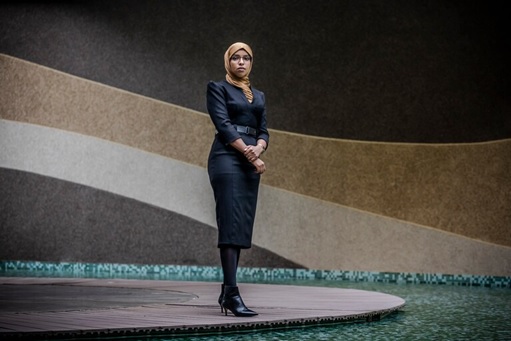By Max Bearak

NAIROBI — Ethiopia’s Prime Minister Abiy Ahmed took a sizable risk when he chose her as the youngest minister in his cabinet: Filsan Abdi was an outspoken activist from the country’s marginalized Somali community with no government experience. She was just 28.

Like so many, she was drawn by Abiy’s pledges to build a new Ethiopia, free of the bloody ethnic rifts of the past — overtures that built Abiy’s global reputation as an honest broker and helped win him a Nobel Peace Prize.Then the opposite happened.
Less than a year into her tenure, Ethiopia was spiraling into an ethnically tinged civil war that would engulf the northern part of the country — Africa’s second most populous — and as the head of the ministry overseeing women’s and children’s issues, Filsan found herself tasked with documenting some of the war’s most horrific aspects: mass rapes by uniformed men and the recruitment of child soldiers.
In September, she became the only cabinet minister to resign over Abiy’s handling of the war.
This week, Filsan, now 30, broke her public silence in a lengthy, exclusive interview with The Washington Post, in which she described cabinet discussions in the lead-up to the war, official efforts to suppress her ministry’s findings about abuses by the government and its allies, and the resurgent ethnic divisions fracturing the country.
A spokeswoman for Abiy declined to comment on Filsan’s recollections.
“The war has polarized the country so deeply that I know many people will label me as a liar simply because I say the government has also done painful, horrible things,” Filsan said. “I am not saying it was only them. But I was there. I was in cabinet meetings, and I went and met victims. Who can tell me what I did and did not see?”
In the 14 months since Ethiopia’s war began, the world has largely relied on the scant access the government has granted to a handful of journalists and humanitarians for any kind of independent reporting. Tigray, Ethiopia’s northernmost region, where the war had been contained until June, has been subjected to a near-total communications blockade since fighting began in November 2020.
In the information vacuum, a propaganda war has flourished alongside the very real fighting that has claimed thousands of lives, and even the most basic story lines of the war are hotly contested.
Who started it? Who carried out the atrocities — massacres, summary executions, intentional starvation, mass rapes, hospital lootings, the arming of children — that people from across northern Ethiopia have recounted, either in their ransacked villages or in refugee camps? Is ethnic cleansing underway? Is Ethiopia’s government winning or losing the war?
In January, Abiy prematurely answered the last question by declaring the war over. He brought a group of ministers including Filsan to Tigray’s capital, Mekelle, which government troops had taken over from the Tigray People’s Liberation Front, a well-armed regional political party resented elsewhere in Ethiopia for its outsize role in the repressive government that ran the country for three decades before Abiy’s ascendance.
Abiy accuses the TPLF of instigating the war with an attack on a military base, in which Tigrayan soldiers killed scores of non-Tigrayan soldiers. TPLF leaders say they were defending themselves. In any case, the conflict quickly metastasized, drawing in ethnic militias and the army of neighboring Eritrea.
In Tigray, Filsan was told to create a task force that would investigate widespread claims of rape and recruitment of child soldiers.
“We brought back the most painful stories, and every side was implicated,” she recalled. “But when I wanted to release our findings, I was told that I was crossing a line. ‘You can’t do that,’ is what an official very high up in Abiy’s office called and told me. And I said, ‘You asked me to find the truth, not to do a propaganda operation. I am not trying to bring down the government — there is a huge rape crisis for God’s sake. Child soldiers are being recruited by both sides. I have the evidence on my desk in front of me.’ ”
Source: The Washington Post


